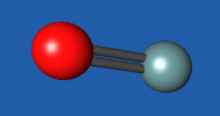
KNOWPIA
WELCOME TO KNOWPIA
Summary
Germanium monoxide (chemical formula GeO) is a chemical compound of germanium and oxygen. It can be prepared as a yellow sublimate at 1000 °C by reacting GeO2 with Ge metal. The yellow sublimate turns brown on heating at 650 °C.[1] GeO is not well characterised.[1] It is amphoteric dissolving in acids to form germanium(II) salts and in alkali to form "trihydroxogermanates" or "germanites" containing the Ge(OH)3− ion.[2]

| |
| Names | |
|---|---|
| IUPAC name
germanium(II) oxide
| |
| Other names
germanous oxide
| |
| Identifiers | |
| |
3D model (JSmol)
|
|
| ECHA InfoCard | 100.039.914 |
PubChem CID
|
|
| |
| |
| Properties | |
| GeO | |
| Molar mass | 88.6394 g/mol |
| −28.8·10−6 cm3/mol | |
Except where otherwise noted, data are given for materials in their standard state (at 25 °C [77 °F], 100 kPa).
Infobox references
| |
Chemistry edit
Germanium oxide decomposes to Ge and GeO2.[3]
See also edit
References edit
- ^ a b Greenwood, Norman N.; Earnshaw, Alan (1997). Chemistry of the Elements (2nd ed.). Butterworth-Heinemann. ISBN 978-0-08-037941-8.
- ^ Egon Wiberg, Arnold Frederick Holleman (2001) Inorganic Chemistry, Elsevier ISBN 0-12-352651-5
- ^ Shriver and Atkins. Inorganic Chemistry (5th Edition). W. H. Freeman and Company, New York, 2010, pp 365.


